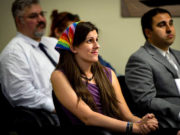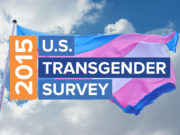As I’ve mentioned several times in my writing, there have been several occasions in which someone told me they mistook me to be a gay male, but it wasn’t until I had dinner with friends when one of them actually explained why. When the husband of my friend admitted to thinking I was a gay guy I said,”Yeah, I get that occasionally, I think it’s because I still have some feminine mannerisms.” He said that, while that is true, it was the mostly because of the way I spoke. In more detail, he explained that feminine people such as women or gay men elongate the pronunciation of some of their words. After having it so clearly pointed out to me I started to listen to how I was speaking and realized I definitely was elongating words that men, typically, use in a more clipped manner.
“…not every trans man needs to sound masculine and most may not even care what they sound like.”
I, personally, find insight like this incredibly valuable as I lean towards trans-masculine and, as such, like learning what quirks I have that could cloud that personalized image of myself that I’m going for. Alternatively, not every trans man needs to sound masculine and most may not even care what they sound like. It is, however, something I care about but not just because I’m going for trans-masculine. I find it incredibly interesting to learn about what subtle nuances we all possess that act as queues for those around us and how those are translated and perceived. I tried to research how to speak like a man, especially from a transgender aspect but this NY Mag article was the best I could find and this WikiHow article where #5 has some good suggestions regarding voice-deepening exercises (but not insight as to the actual manner of speech). There were, however, a significant amount of pages dedicated to assisting trans women on making their speech more “passable”, “feminine”, and “higher pitched.” The other options I found were articles dedicated to helping you become a better or more powerful speaker in general, which isn’t really within the scope of what I was researching.

The low-down seems to be to make your words short and clipped. There seems to be some unique knack for speaking in this manner without necessarily sounding like you’re being nasty or curt with someone. It’s not really something that can be described in text, but rather something you need to tune your ear into when around men and attempt to pick up those subtle variations. Alternatively, it’s a wonderful trait to be aware of on the flip side so that trans woman learn to not speak in such clipped tones, but rather to elongate some of their keywords. For some incredibly interesting insight into manners of speech and how “gay people sound” you should check out David Thorpe’s Do I Sound Gay movie.
“It’s not just the sound of your words, however, as the specific words you decide to use are equally important.”
It’s not just the sound of your words, however, as the specific words you decide to use are equally important. The friend I mentioned early also pointed out that, as a man, there some words used in certain situations that are no longer appropriate. As I was relaying a story about my young nephew and that I used the word “honey” and he explained that in some instances, especially around strangers, that using the word “honey” towards a young boy could be perceived as “creepy” or, once again, gay/flamboyant. It never occurred to me prior to this encounter with my friend that even the specific word you use could be a “tell” or misinterpreted by someone. It’s these things that you encounter throughout your transitional journey that no one really seems to give you a heads up about.
As I said, many people don’t care how they sound or how society perceives them. For me, it’s not that I’m interested in conforming because of society, but rather because I have an image of myself for myself that I want to work towards becoming, and feedback like this is extremely valuable to me. It’s not something I’ve come across while researching everything I could find about transitioning, so it’s something I wanted to cover briefly for those who may come across a similar hiccup.
































